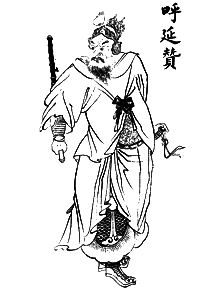Huyan Zan
| Huyan Zan | |
|---|---|

from one 1892 print of the novel Legends of Generals of the Yang Family (楊家將傳)
|
|
| Native name | Family name: Hūyán () Given name: Zàn () |
| Died | 1000 Kaifeng, Henan |
| Home town | Taiyuan, Shanxi |
| Children |
|
| Parent(s) | Huyan Cong (呼延琮), father |
| Huyan Zan | |||||||||||||||
| Traditional Chinese | |||||||||||||||
|---|---|---|---|---|---|---|---|---|---|---|---|---|---|---|---|
| Simplified Chinese | |||||||||||||||
|
|||||||||||||||
| Transcriptions | |
|---|---|
| Standard Mandarin | |
| Hanyu Pinyin | Hūyán Zàn |
| Wade–Giles | Hu1-yen2 Tsan4 |
| Yue: Cantonese | |
| Yale Romanization | Fu1-yin4 Jaan3 |
| Jyutping | Fu1-jin4 Zaan3 |
Huyan Zan (呼延贊) (died 1000) was a military general in the early years of imperial China's Song Dynasty. He participated in Song's conquest of Later Shu Kingdom in 964-965 and Northern Han Kingdom in 979. Later he helped defend Song's northern border against the Khitan-ruled Liao Dynasty.
His surname Huyan suggests Xiongnu origins. A fierce warrior, Huyan Zan is known for tattooing the words "fervently kill the Khitans" (赤心殺契丹) all over his body, as well as on that of his wife and servants.
Born in a military family, Huyan Zan started his career as a cavalryman in the Song Dynasty army. Emperor Taizu of Song recognized Huyan's talent and promoted him to the rank of a commissioner of the imperial cavalry (驍雄軍使).
In 964, Huyan followed general Wang Quanbin (王全斌) to invade the Later Shu Kingdom as a vanguard general. He was wounded several times in battle and later promoted to deputy command commissioner (副指揮使) for his contributions in ending Later Shu.
During the reign of Emperor Taizong, Huyan was further promoted to a command commissioner of armoured cavalry (鐵騎軍指揮使). In the campaign to invade the Northern Han Kingdom in 979, Huyan charged ahead of his men and was among the first to climb the defensive wall of Northern Han's capital Taiyuan. He fell from the wall 4 times and was injured, but he continued attempting to scale the wall. For his bravery, Huyan was rewarded with gold and silk by Emperor Taizong in the imperial court.
...
Wikipedia
